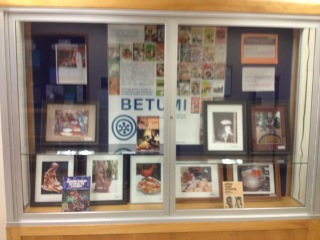Though I'm in Ghana, my thoughts are turning towards the upcoming fall semester that begins at Penn State in August. Helen Sheehy, Head of the Social Sciences and Donald W. Hamer Map Libraries, has curated an exhibit of photos from BETUMI that graces the entrance to the undergraduate social sciences library at the University Park campus of Penn State. I am grateful for the exposure, and hopeful that some of the undergraduates may stop to check out the exhibit and be enticed to sign up for the fall offering of my African Foodways course (AFR297B).
BETUMI: The African Culinary Network (www.betumi.com) connects anyone who delights in African cuisine, foodways, and food history.
Showing posts with label Penn State. Show all posts
Showing posts with label Penn State. Show all posts
Friday, July 12, 2013
Friday, November 30, 2012
Plating Africa's cuisines
Even if you cannot obtain a copy of this beautiful magazine, you can at least sign up at their online site to view recipes, including one of mine for groundnut soup.
* * * * * * * *
Among other things, I was happy that the article in plate recognizes Penn State's pioneering course on African food culture.The course is swiftly drawing to a close: just 2 more weeks, and the students are preparing their final presentations: on food themes in selected West African novels, on kola nuts, injera, indigenous red rice, fermentation, and the social and culinary challenges facing pastoral peoples . . . It has been a privilege to teach these young people, and we're all looking forward to the end of course pot-luck celebration where everyone selects an African recipe to research and prepare (with promises that the quality of the cooking is not going to compromise anyone's grade in the course). Commensality and hospitality are important components of sub-Saharan African food cultures, and it seems only fitting to end on that note. I am very proud of the students who've followed me on this journey of discovery.
Labels:
Marcus Samuelsson,
Penn State,
pierre thiam,
plate magazine
Wednesday, February 29, 2012
Washington Post Celebrates West African Cuisine (and travel updates)
February 29, 2012: Happy Leap Year's Day! I was pleased to read Tim Carman's food column today (on West African cuisine) in the online version of The Washington Post. He had interviewed me at length for background, and I was thrilled that he shared about the search for a publisher for the regional Ghanaian cookbook Barbara Baeta and I are writing. Incidentally, while the bulk of The Washington Post makes its way to our little community, it does not include the Lifestyle/Food section, so consider this a plea for any of you who are in that area to pick up a copy for me and send it to me at BETUMI, P. O. Box 222, State College, PA 16804. Thank you, I'd be very grateful.
Now that I'm back from Nigeria, I head to Oregon for a few days next week, then will attend the International Association of Culinary Professionals (IACP) conference in New York City at the end of March and beginning of April.
Later, in June, I'll be at the IFT (Institute of Food Technologists) annual conference in Nevada, speaking on
Beyond Peppers, Peanuts, and Palmfruit: The Multilayered Tastes and Textures of African Cuisines
The presentation "will introduce sub-Saharan African flavor principles, ingredients, and cooking equipment and techniques, with special emphasis on western Africa. From the special texture created by the ridged grinding bowl called “asanka” in Ghana to the signature steamed bean pudding “moinmoin” of Nigeria, from “Grains of Paradise” and fonio and other “Lost Crops of Africa,” and on to Africa’s love affair with New World crops (e.g., cassava, maize and peanuts), this session will celebrate the abundance and diversity of good tastes from Africa."
I'm also on the books to teach a new course in the African Studies Department at Penn State for the fall semester: Food Culture in Sub-Saharan Africa.
I'll keep you posted on these and other activities. Meanwhile, I'm still filing away a massive amount of papers from the last few months, but haven't forgotten my promise to post the recipe for the cassava biscuits/cookies I made last December. It will be coming soon.
Monday, June 15, 2009
Historic African Cuisine Panel at the ASFS/AFHVS Conference
Saturday morning): we started off with Cindy Bertelsen's overview of African flavor principles (see her Gherkins and Tomatoes website for more information: principles-out-of-africa/ (the basics); principles-out-of-africa-a-fish-tale/; principles-out-of-africa-its-the-beans/ (fermentation and oilseeds);
summarized his original research on the evolving role of the African giant land snail in the diet in parts of Cameroon. Please
personally love to see sessions on African cuisine in literature and art, or on African cuisines and culinary tourism. Our biggest
For more pictures, go to BETUMI on flickr (ASFS/AFHVS May 30, 2009).
Labels:
AFHVS,
African food,
African food history,
ASFS,
Bertelsen,
Cusack,
Fomine,
Penn State,
PSU,
Twitty
Friday, February 27, 2009
Touch of Africa; Spring Class on African Food and Culture
Sore Shields of The African Market and I coordinated a silent auction to raise money for 2 charities in Africa, and Kunmi Oluleye of Flavors of Africa generously donated copies of her cooking dvd of Nigerian, Kenyan, and South African cooking (first in a series of 17 planned). Thank you to everyone who helped and bid on the items.
Now, I need to get ready to teach a five-week African cooking (and culture) course beginning March 18. . . Never a dull moment.
Subscribe to:
Posts (Atom)





